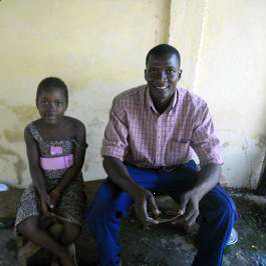In Guinea, malaria is the leading cause of consultations (33.8 percent), hospitalization (31 percent), and death (14.2 percent). All people, particularly children under five and pregnant women, are at risk. In line with World Health Organization recommendations, the Ministry of Health adopted a policy to confirm all suspected malaria cases before treatment.
With funding from the President’s Malaria Initiative (PMI), in fiscal year 2014, the StopPalu project trained more than 1,000 health facility workers (public and private) in 14 prefectures on behavior change communication, malaria prevention, diagnosis through the use of rapid diagnostic tests (RDTs), management of simple cases using artemisinin combination therapy (ACT), treatment of severe cases, and monitoring and evaluation.
The rural municipality of Doupourou is one of the eight municipalities in the prefecture of Boffa. It is located 25 kilometers from the center of the prefecture and has a total population of 21,594 who are mostly agro-pastoralists and fishermen. The practice of self-medication and the use of traditional healers have been very common among this population. However, the chief of the Doupourou health center, Mr. Charles Sakele Keita, reports that availability of RDTs and ACT along with training for community health workers are contributing to a reversal of this practice.
In August 2014, Mr. Keita, who was trained by StopPalu, received a family with a child who had been sick for several days. During the examination, the family admitted that the child had been treated by two traditional practitioners without improvement. Noting the worsening state of the child, the parents had decided to bring her to the health center. At the center, Mr. Keita performed an RDT, which was positive. He treated the child at no cost and provided advice on the prevention and treatment of malaria to the parents.
After five days of observation, the child regained her health. Delighted and relieved, the family returned to the center to express their appreciation to the head of the center. Subsequently, the father has committed himself to attending meetings for community awareness to encourage other families to access services at health facilities. Currently, he is organizing awareness-raising sessions in villages to promote the use of health facilities and spread the news of his family’s joyous outcome.

